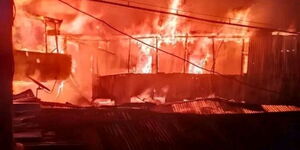Update: Former President Mwai Kibaki passed away on Friday, April 22, 2022. President Uhuru Kenyatta announced.
Former President Mwai Kibaki has often been touted as one of the greatest leaders in Kenyan history. During an impassioned speech in the Senate on July 28, Siaya Senator James Orengo bravely stated the same and was backed by a unified and thunderous applause.
Despite his political misgivings, Kibaki's legacy has remained untainted over the years, with his development track record seen as a major reason for Kenya's rapid economic growth during his 10-year tenure.
What he lacked in political skills, he made up for with some witty and often comical remarks during his speeches.
During his inauguration speech on December 30, 2002, Kibaki prioritised the economy as his core focus, having inherited myriad challenges.
"You have asked me to lead this nation out of the present wilderness and malaise onto the promised land. And I shall. I shall offer a responsive, transparent and innovative leadership. I am willing to put everything I have got into this job because I regard it as a sacred duty," he boldly declared at the time.
Here's is a brief overview of how Kenya's third president managed to cement his legacy during his 2 terms in office.
Infrastructural Development
An exceptional economist, Kibaki set about implementing the country's largest-ever infrastructral development projects, explaining that this would greatly boost trade and economic growth.
The Ksh31 billion Thika Superhighway was the crowning jewel of his projects, with the various by-pass routes turning acres and acres of the country that were previously uninhabited, to thriving trade centres.
A trip to Kamakis area located on the eastern bypass can give a clear picture of how roads affect trade.
In July 2012, Kibaki commissioned the Olkaria 280 MegaWatt (MW) geothermal project which raised Kenya Electricity Generating Company’s (KenGen) total electricity capacity by 25%.
He is also credited in setting in motion the development of the Lamu corridor projects, whose implementation is expected to change the economic face of Northern Kenya.
His legacy on infrastructure development will certainly be well-acknowledged for many years to come. He also laid out the master plan for the Jomo Kenyatta International Airport Expansion and highlighted the need for a modern railway system.
Education Sector
On February 18, 2013, a group of 2,907 students serenaded President Kibaki with poems of gratitude for launching the free primary education program.
“Tell me why in 2030, I will not be on the east side of Manhattan where the UN headquarters are located waiting to be sworn in as the next secretary-general,” recited the beneficiaries in a poem to the President.
Having promised to revive the education sector during his inauguration, he followed through with the free primary education project.
This led to the enrollment of over a million students who would have otherwise been unable to afford tuition fees.
Enrolment in primary schools climbed from six million in 2002 to 9.3 million by 2010, a clear indicator that the free primary school education program attracted more children to school.
Social Development
One of the areas where Kenya witnessed a sizeable growth was in lowering the number of children and mothers who die at birth in the past decade.
In 1990, out of a sample 1,000 babies born, 64 or 6.4% would die before their first birthday, 100 would die before the age of 5.
However, by 2009, child deaths before first birthday had fallen to 55 deaths per 1,000 births and 84 would see their fifth birthday.
Kibaki also oversaw full immunisation coverage for children under one year grow from 47% in 2002, to 83% in 2010, an indicator that more children were protected from killer diseases such as TB, polio, and measles.
To put Kibaki's legacy into perspective, at an average exchange rate, in 2002, public spending ranged at $3.6 billion, however, by 2011 it was ranging at $12.5 billion.
The massive growth in public expenditure was largely funded by increased tax collection as the economy had grown and improved collection rates.
To cap it off the country witnessed a GDP growth from a low 0.6% (real −1.6%) in 2002 to 5% in 2011.
He may not have been the most elite politician and he certainly had several flaws, but it can be argued that his focus on growth and development ushered the country towards a new era. This could be why Siaya Senator recently described him as the greatest president the country has ever had.
Watch Orengo's impassioned speech below:
{"preview_thumbnail":"/files/styles/video_embed_wysiwyg_preview/public/video_thumbnails/qtsjNUuD3xs.jpg?itok=nBoMQ3Z7","video_url":"","settings":{"responsive":1,"width":"854","height":"480","autoplay":0},"settings_summary":["Embedded Video (Responsive)."]}












